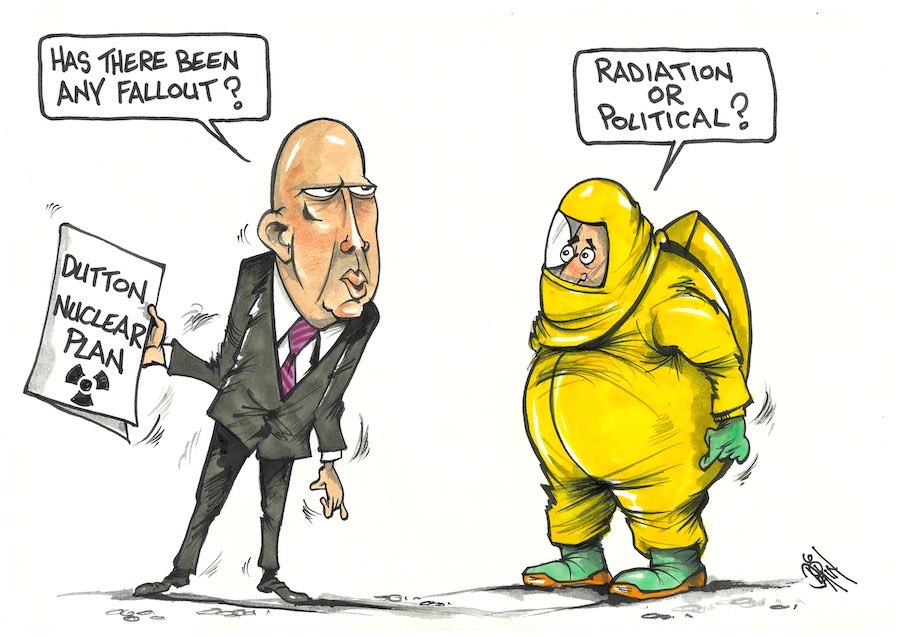
Opposition Leader Peter Dutton is seated aloft the nuclear tiger, hoping not to get eaten, says political columnist MICHELLE GRATTAN.
No one doubts Peter Dutton has a huge task to sell his radical nuclear plan, with many experts throwing buckets of cold water over it. But on Thursday the opposition leader received some welcome backing.
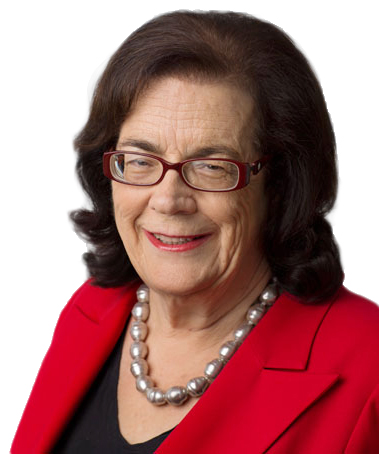
Ziggy Switkowski, who headed John Howard’s 2006 nuclear inquiry that reported favourably on the potential for nuclear energy in Australia, described Dutton as “a person of conviction” and said his blueprint was feasible.
While acknowledging details were needed, including costings, Switkowski, a former chairman of the Australian Nuclear Science and Technology Organisation (and a nuclear physicist), said the scepticism about the plan was misplaced. “The strong positions some critics have taken in the last 24 hours are ridiculous.”
He said in the last 20 years the nuclear debate had been shaped by academics, the commentariat and junior politicians. Now it was being shaped by the leader of the opposition with an emerging coherent plan.
Peter Dutton and energy spokesman Ted O’Brien “are as well informed on things nuclear as any group I’ve talked to in the last 20 years in Australia,” Switkowski said, adding Dutton was “exactly right” in saying the nuclear generators should be government-owned.
In the timing of his announcement, Dutton is putting his nuclear power policy through an early stress test.
Politics often swings to and fro on the “vibe”. The vibe has recently been running against the Labor government, with polls in Nine newspapers this week suggesting Anthony Albanese doing poorly.
Parliament is about to start its final fortnight before a winter break, giving the government the chance for sustained king hits on the nuclear policy. If Labor can use the sitting to its advantage, and Dutton also takes a knock in the next polls, the “vibe” will change. The government could regain some momentum. It should be helped in this by the July 1 start of the tax cuts.
Labor is galvanised by the need to win the early post-announcement clash. Albanese is energised, with crafted lines. “This is just a fantasy,” he said on Thursday. “Instead of Snow White and the seven dwarves, this is Peter Dutton and the seven nuclear reactors.”
And, “you would have us believe that a mob who’d struggle to assemble an IKEA flat-pack are going to start from scratch and be able to develop a nuclear energy industry in Australia”. It’s unclear whether he crafts his own zingers.
Both sides claim to welcome the election being a referendum on energy. It’ll be about much more than that but energy – the government’s transition progress, the opposition’s response – will be a central battleground. With nuclear firmly out there, the weaponry is being marshalled.
By announcing the seven proposed sites for reactors, Dutton is attempting to reduce uncertainty, and counter the “would you want a reactor in your backyard?” scare.
Indeed the Coalition proposes to put the reactors – all on sites of former or current power stations – in its own backyards.
Of the seven seats involved, five are Coalition (three held by the Nationals, two Liberal). The affected part of the one Labor seat, Hunter, would transfer under the draft redistribution boundaries into the New England electorate of former Nationals leader Barnaby Joyce (a great fan of nuclear). The remaining seat, Calare, is held by independent Andrew Gee, formerly a National.
Of the seats, only one is on a margin of less than 5 per cent (Flynn in Queensland).
Opposition sources say that in its polling, nuclear had more than 50 per cent support in all these electorates. But the polling hasn’t been released.
Communities affected will be offered packages but there will still be local dissent over the plan. So local divisions will be running on two tracks in coming months – in the Dutton areas over the nuclear proposal, and in various other places over the rollout of transmission infrastructure and big renewable projects.
While naming the sites early is sensible, holding back the plan’s cost leaves the Coalition open to attack, especially given a major question over nuclear is that it’s so expensive.
There’s also the criticism the Coalition’s plan is pitched so far into the future it could create a big gap in the middle of Australia’s energy transition.
Dutton has abandoned Australia’s 2030 emissions reduction target; the renewed climate and energy wars are likely to hit investor confidence; and it’s not clear to what degree a Coalition government would slow the renewables rollout. All this could leave Australia in a limbo land in the late 2020s-early 2030s.
And history tells us it would be a miracle if the nuclear projects were on time or on budget (think Snowy Hydro 2).
The Coalition can thank Labor’s embrace of AUKUS for undercutting the safety argument. The planned nuclear-powered submarines with their attendant needs, facilities and waste have bipartisan support.
Nevertheless safety will be an issue for some people. In vox pops this week, there were mentions of Chernobyl and Fukushima.
On the other hand, views about nuclear have substantially softened over the years. In the 2024 Lowy poll 61 per cent supported Australia using nuclear power to generate electricity. In 2011, in a related question, 62 per cent were against Australia building nuclear power plants as part of its plans to cut greenhouse gas emissions.
Regardless of polling, given the danger of big-target election pitches, Dutton’s nuclear radicalism is remarkable, albeit that it’s partly driven by a risk-averse desire to keep some climate-doubting Nationals in the tent.
One mark of this radicalism is the pledge the generators would be government-owned. It’s a reminder the Coalition easily shrugs off its “small government” cloak, just like it did with all that spending during the pandemic.
Dutton’s nuclear plan has been likened to John Hewson’s Fightback, despite the many differences (including in the leader’s electoral prospects). Fightback might have prevailed if it had not been for then prime minister Paul Keating’s demolition skills. Labor has a similar mission now. It doesn’t have a Keating.
The government has to convince the public Dutton’s nuclear option is policy on the never-never, in cost and timing, plus being a form of climate-change denialism.
Beyond that, however, between now and the election Labor will face many questions on its own energy transition, which is inevitably more bumpy than promised. The better it can credibly defend its record, the easier it will be to discredit the opposition alternative.
It’s too early to predict how voters will judge the energy face-off. Nationals MP Darren Chester, who holds the Victorian seat of Gippsland, which would host a nuclear plant where the Loy Yang coal-fired power plant is located, puts it this way: “We’ve run out on to the field, maybe tossed the coin, but we haven’t even played the first quarter yet”.![]()
Michelle Grattan, Professorial Fellow, University of Canberra. Republished from The Conversation.
Who can be trusted?
In a world of spin and confusion, there’s never been a more important time to support independent journalism in Canberra.
If you trust our work online and want to enforce the power of independent voices, I invite you to make a small contribution.
Every dollar of support is invested back into our journalism to help keep citynews.com.au strong and free.
Thank you,
Ian Meikle, editor
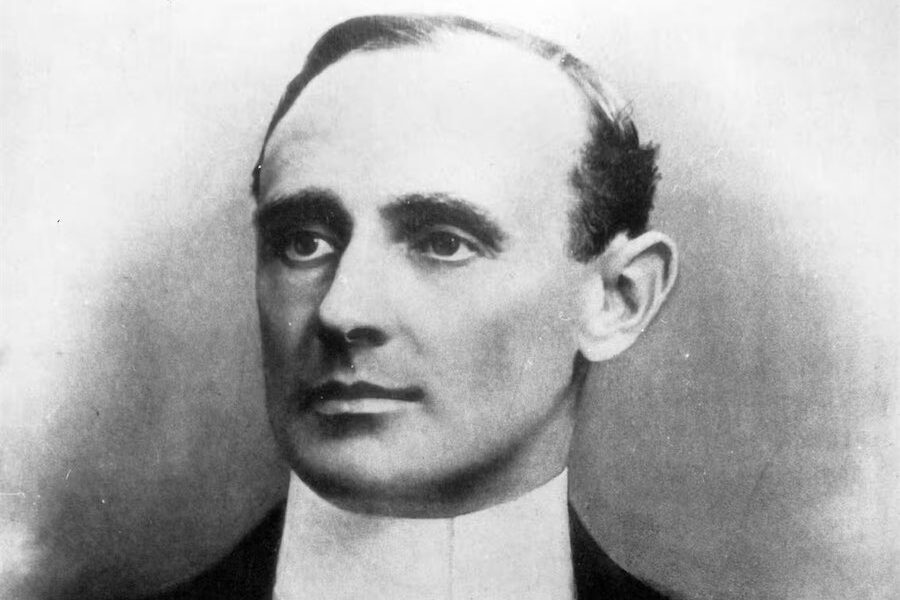
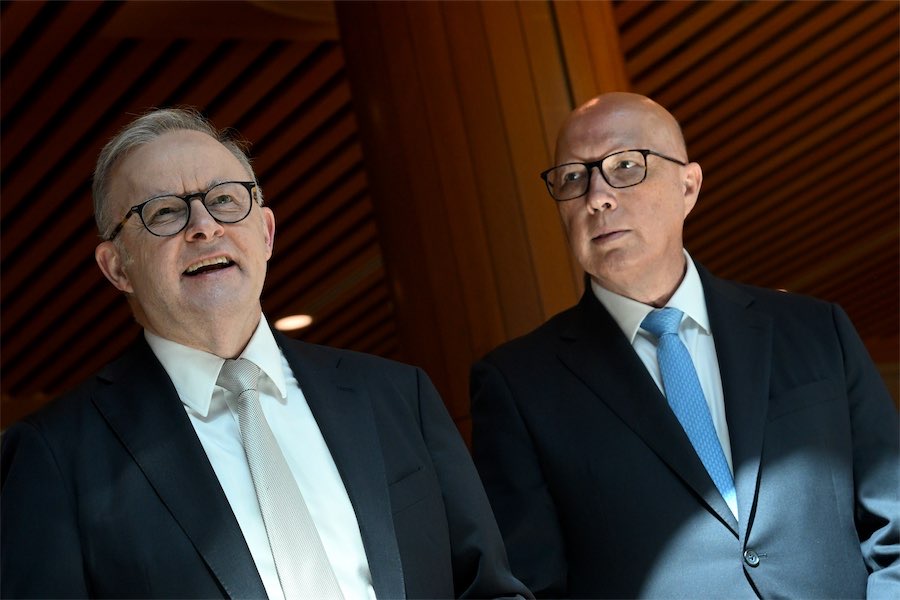
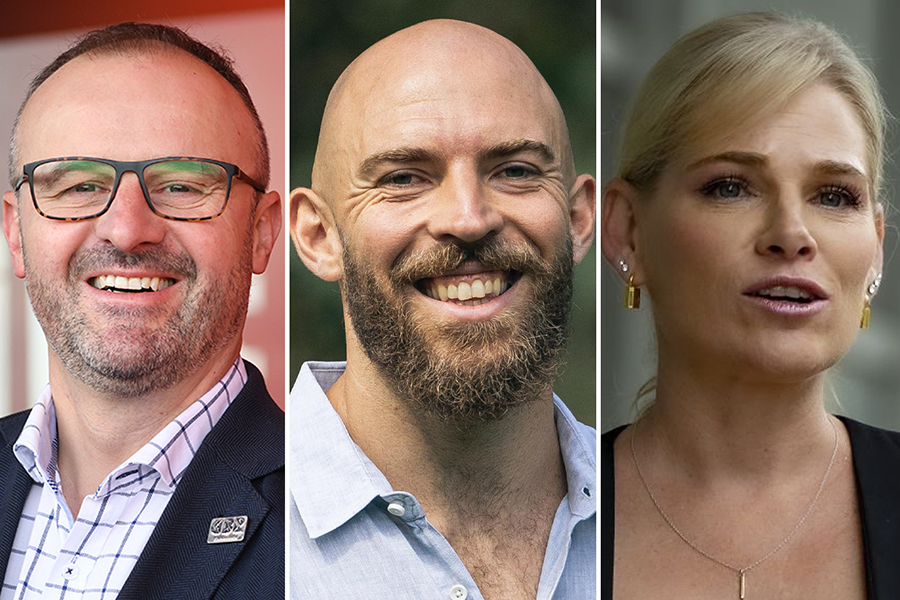

Leave a Reply